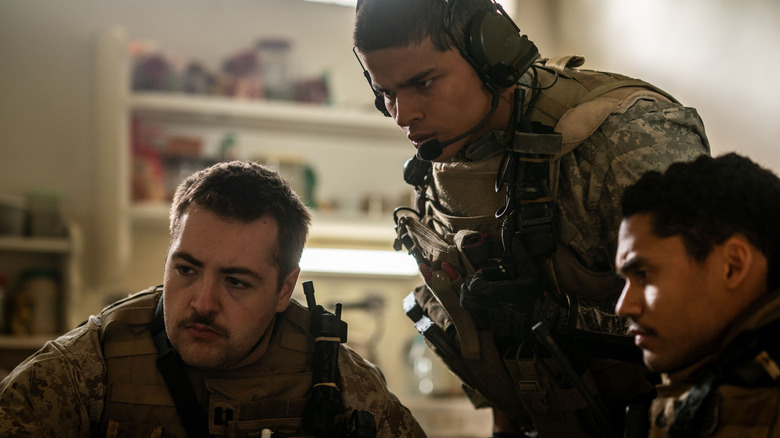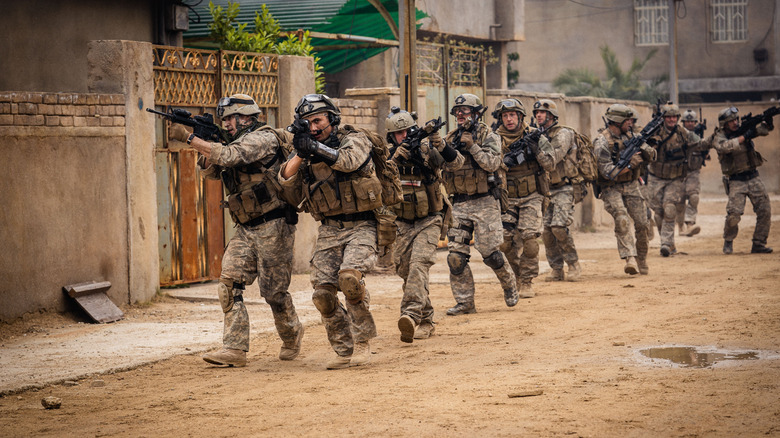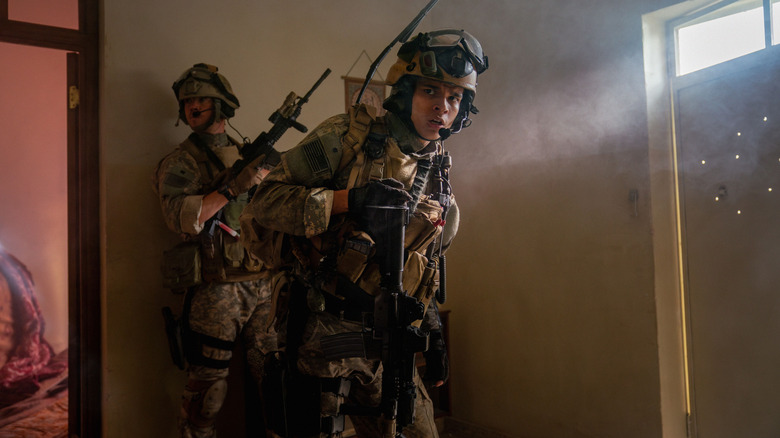How Much Of Warfare Is Based On A True Story? Every Single Part Of It
There are your standard war films, and then there's "Warfare," existing worlds apart and in a league all its own. Alex Garland's latest directorial effort will inevitably feel reminiscent of his prior heart-pounding action/thriller from a year ago, "Civil War," though with several key differences. For one, viewers will quickly realize there is no real "narrative" here in a traditional sense, instead stripped completely of any rousing speeches or acts of glory or overdone clichés. For another, this boots-on-the-ground flick is much more limited in scope, focusing on a single 2006 mission in Iraq gone horribly wrong and told largely in real time. But more than anything else, "Warfare" is a refreshingly true story with little to no exaggeration whatsoever, told from the specific points of view of those who were actually there — including co-director and Iraq War veteran Ray Mendoza.
And that verisimilitude, as it turns out, is the key to what makes "Warfare" such an effective and harrowing watch. Although boasting a cast filled with recognizable names and faces, from "Daredevil: Born Again" star Michael Gandolfini to recent breakout performer Charles Melton to Marvel's newest "Fantastic Four" addition Joseph Quinn, "Warfare" is all about the anonymous soldiers thrown into the muck of war and their attempts to survive in the face of horrific, senseless violence. But when audiences begin making their way into theaters to catch all the action on the big screen, many may come away from it wondering just how much of it is actually based on true events.
True to form, the creative team maintain that every single frame of "Warfare" is raw, unfiltered, and painfully real.
The origins of Warfare, explained
For an experimental film as daring and ambitious as "Warfare," its origins might surprise you. The creative partnership between Garland and Mendoza actually goes back to the making of Garland's similarly explosive "Civil War," a fictionalized depiction of the United States in the near future falling apart under the chaos of a military uprising against an overambitious President. As it so happens, Mendoza's role as a crucial military advisor had a direct impact on the next project the two would decide to pursue.
In a recent interview with /Film's Jacob Hall, Mendoza and Garland explained how the origins of the production arose from a tense sequence staged at the end of "Civil War." Mendoza helped craft the logistics of the climactic siege on the White House, unspooling in real time and without abruptly cutting forward in the edit to skip over any of the minutiae. This led to a discussion about taking this same mentality and applying it to an entire film. According to Garland, "So in [post-production on 'Civil War'] I called Ray and I said, 'Are you interested in making a film that would last an hour and a half or an hour 40 [minutes], thereabouts, and would attempt to be completely faithful to a true sequence of events and we wouldn't distort them or compress them or change them?' [...] And it turned out there was a story Ray had wanted to tell for many, many years for all sorts of reasons, largely though personal reasons."
After talking to the other veterans involved and gaining permission to tell their story, Mendoza settled on one particular Navy SEALs mission during the 2006 Battle of Ramadi in Iraq ... but that was only the beginning of the process.
The number 1 rule in Warfare was that 'nobody is allowed to just invent something'
How far does "Warfare" bend the rules of conventional storytelling? Well, consider the fact that Garland and Mendoza have emphasized that the entire film was based on nothing but memory. Taking their cues from hours and hours of personal interviews, the directors spoke with many of the actual soldiers involved in this series of events. Remembering the details of an operation almost 20 years in the past, where they set up a sniper spot in a residential building in order to keep a close eye on insurgents in a nearby area, is already asking a lot. Turning those recollections and memories into a feature-length film was something else entirely.
But as tempting as it might've been to embellish certain facts or diverge from the real events in order to make things a little more dramatic, the filmmakers instead laid down some key ground rules about how to approach the making of this movie. Garland apparently took direct inspiration from the so-called Dogme '95 movement pioneered by auteurs like Lars von Trier, who emphasized the idea of naturalistic filmmaking taken to an extreme. As Garland explained in his conversation with /Film:
"So this was kind of like a Dogme film in a sense, except the Dogme rule was nobody is allowed to just invent something and anything that makes its way into the film has to be, you can source it from a firsthand account. So that doesn't just limit, it sort of ends my involvement in narrative, as it were. Same with the studio, same with the actors. An actor could not say, 'I feel motivated to get up and walk to the window,' because if there is one of the people there saying, 'You didn't walk to the window, you sat right there,' well that's the end of the conversation. So we did not invent."
As a result, broadly speaking, everything in "Warfare" is based on a true story — whether it's taken from hazy recollections, official military accounts of strategy and training, or simply an extension of what each soldier was feeling at any given moment. The result is a rare experience truly unique from any other.
You can hear the full interview with the filmmakers on today's episode of the /Film Daily podcast:
You can subscribe to /Film Daily on Apple Podcasts, Overcast, Spotify, or wherever you get your podcasts, and send your feedback, questions, comments, concerns, and mailbag topics to us at bpearson@slashfilm.com. Please leave your name and general geographic location in case we mention your e-mail on the air.
"Warfare" is now playing in theaters.


